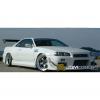Which Gauge To Use?
Announcements
-
Similar Content
-
Latest Posts
-
By BuiltNotBought · Posted
I see, honestly I’m not too fussed about the looks. The only reason to go plenum is to make the piping easier instead of the classic over the rad etc. -
Not easy to quantify wrt something like how many fractions of a second slower it would be over 0-100. But given that a 250-300rwkW car is able to do that launch sprint in 5-6 sec (and faster with appropriate tyres, and surface)..... giving up as much as a second would feel like torture. A ~450HP capable turbo is not going to make lots of boost in the 2000-3000 rpm range. So, whilst with some boost on hand it will be faster accelerating in that rev range than your engine currently is NA, it will not feel like a fast car until the boost is solidly in. You know what your car feels like right now when you open it up at 2000rpm. if you've ever been in an actual fast car, you will appreciate that the NARB25 is.... not exciting. Well, add some boost and it will be better. But shorten the intake runners and it might not be better at all. It might come out better, but it could end up feeling the same. For me, it's not the 0-X km/h sprints that matter. It is easy to fry the tyres with anything over 200 rwkW. You can't use all the power available in 1st and 2nd anyway, you have to modulate the throttle. What matters is how the car reacts when you're driving in traffic in 4th or 5th and have maybe 2000 rpm on board, and you want/need to add some speed quickly, and don't have time for the downshift. It won't make boost, it will be all NA (at the speeds we're talking about - remember how fast you're going at 2000 in 4th! and don't plan on breaking the limit by too much.) So giving away NA torque is not what I would consider practical for a street car. And retaining that NA torque builds boost faster which makes the car faster. The flashy plenum is not actually better, unless you're looking at a track car where you can keep it on the boil all the time.
-
By BuiltNotBought · Posted
So how much difference does it make you think? Like 1 second in the 0-100? I was have smaller turbo so hopefully that spools quick GTX2871. currently it’s NA so you can imagine pretty slow, but I do want fast accusation a little as there’s not many places I’ll be driving where I go over 80 even near me. So 0-60 and 0-80 targets -
Short inlet runners cost quite a bit. Dulls off the off-boost torque, and delays boost onset, because arrival of boost is driven by gas flow is a product of the ability to flow air which is torque. This is the reason that the stock manifolds have longer runners. On a 3L, or bigger, you can usually accept the compromise of giving away some torque because the extra capacity gives you a little extra to waste. But on a smaller motor, there's not a lot there to start with. Example, I swapped RB20 out of my R32, 25NeoDET in its place. The "wall of torque" that I experienced afterwards made it all worthwhile. That's because I came from RB20 land where torque is not a thing. But I would not do anything, anything at all, to reduce the low/mid torque I have now, because I remember what it is like to not have it!
-
By BuiltNotBought · Posted
Really, low/midrange torque goes really bad?? I want decent acceleration, maybe I use a stock rb25det neo manifold?
-





Recommended Posts
Create an account or sign in to comment
You need to be a member in order to leave a comment
Create an account
Sign up for a new account in our community. It's easy!
Register a new accountSign in
Already have an account? Sign in here.
Sign In Now